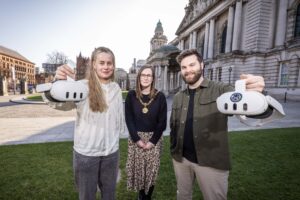The Alzheimer’s Society and Sport England partner with Social Ability to launch games and activities based on interactive light tech.
Pop bubbles, play the piano and even sing karaoke – a new initiative launching this week aims to bring more happiness to people living with dementia, and evidence shows it has a positive impact on health outcomes.
Some 900,000 people in the UK are currently living with dementia and that figure is expected to rise to 1.6m by 2040. This week is Dementia Action Week and at Infotech we’re looking at the ways technology can help. The Happiness Programme is one such initiative.
It’s just been announced that the first-of-its-kind initiative will launch a new project in 10 care homes across the UK, in places included Bexhill, Derby, London, Manchester, Newcastle and Sheffield.
The initial three-month phase will focus on pre-existing Happiness Programme games and activities. These use interactive light technology that enables users to take part in physically and mentally engaging fun. Activities include popping bubbles, playing the piano, colouring pictures, sweeping leaves, karaoke, bingo and quizzes.
In the second three-month phase, new games will be trialled with a focus on encouraging movement and physical activity. The activities are being co-designed with the Alzheimer’s Society and funded by Sport England.
Developed by Social-Abilty, the Happiness Programme uses a portable projector that can be set up wherever it feels most comfortable for the person who’ll use it – whether that’s on the floor, walls or ceiling, on a whiteboard or in bed. That’s key to its success give that, according to research by Sport England, those with long-term health conditions such as dementia are twice as likely as others to be inactive.
Social-Ability already has a proven track record in this area, working with more than 1,250 partners in the care sector across the UK, Ireland and Canada. In a survey of users, 98% of care services saw improvements in social and physical well-being as a result of increased levels of activity through the Happiness Programme, and 89% saw improvements in cognitive well-being. One-in-six care services observed fewer falls and one-in-five saw improvements in nutrition and hydration among cared-for people.
John Ramsay, Managing Director and Co-Founder of Social-Ability, says: ‘We’re thrilled to partner with Alzheimer’s Society and Sport England to expand the Happiness Programme’s reach to those who truly need it. I founded Social-Ability to bring laughter and happiness to everyone facing dementia as well as for palliative care, rehabilitation, and those with learning disabilities. Working collaboratively is extremely important to us to grow the impact of Social-Ability, and we are honoured to be working alongside such a creative and experienced innovation team. We’re so excited to see the results of the project – in 2024, nobody living with dementia should be without laughter or activity.’
Simon Lord, Head of Innovation at the Alzheimer’s Society, adds: ‘As we announce our partnership with Social-Ability, we’re excited to combine our trusted expertise in dementia and physical activity with the proven efficacy of the Happiness Programme, supported by funding from Sport England. Keeping active is hugely important for people with dementia and has a range of benefits such as improved quality of life. This partnership underscores our commitment to evidence-based practices, and we look forward to seeing the results of the new meaningful activities and the potential improved outcomes for people living with dementia.’
In related news:
Interview: HUG by LAUGH — the science of teddy bears for people living with dementia

















Leave a Reply